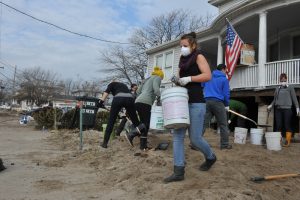Major Emergencies: why we need to manage Good Samaritans
Global disasters are on the rise, and with 24-hour news and social media, so are the numbers who hear about them and want to help. From recent events in Paris, to last year’s severe flooding in the UK, volunteers played a part in rescue efforts. But with so much ‘real time’ news available, the number of spontaneous volunteers who ‘just turn up’ is increasing. Duncan Shaw explains why he believes the Cabinet Office is right to be working on guidance for emergency planners to manage this increasing resource – to maximise its potential and minimise the risks.
During my work with UK and EU governments I was asked to research how volunteers respond to major flooding emergencies when the UK was inundated with severe storms in the winter of 2013/14. The storms produced heavy rains which caused widespread flooding in the South of England and most notably the Somerset Levels and parts of Lincolnshire.
This study was part of a year-long analysis of spontaneous volunteers – members of the public who just show up and want to help those affected by an emergency. We class them as being unaffiliated with existing official response organisations yet, without extensive preplanning, were motivated to provide unpaid support to the response to an emergency, or recovery, afterwards.
There is no doubt that these ‘good samaritans’ represent a potentially important valuable resource to emergency managers, particularly at times of financial constraint, but what our research clearly uncovered is that they can, in some cases, put themselves or others at risk. Emergency responders may then end up having to save the volunteers who get into problems – putting the volunteer and the rescuers in further potential danger .
Our findings show that national non-statutory guidance would help to inform the official involvement of spontaneous volunteers during a flood. This is because the responsibility for the involvement of these volunteers during emergencies is one that many Local Authorities are currently wrestling with. When left unmanaged, our research shows that spontaneous volunteers may respond emotionally and, whilst their intentions are good, they may be unaware of hidden dangers because most will lack the awareness, training and experience of these types of disasters.
Managing misinformation
If managed correctly then spontaneous volunteers can be a huge source of good. They can support the most affected citizens in recovering from an emergency – providing a local and personal support network. They can conduct important tasks to free the emergency services to focus on the more challenging tasks that require professional know-how and specialist equipment.
We also found that some volunteers spontaneously volunteered because of calls for help on social media. A groundswell of activity from citizens has sometimes helped to very swiftly identify who has a particular need, who is able to support that need, and matched those for an almost instant response. However, social media also led to the dissemination of misinformation and, sometimes distracted emergency responders who had to deal with such misinformation before new challenges emerged as a result.
Safety is paramount. We’ve come across numerous examples when things could have gone wrong if local authorities had not been as vigilant and provided necessary support to well- meaning volunteers before they put themselves or others into more difficult situations.
Key recommendations
We found that three of the strategies to be addressed in the short-term were: to establish a working group to develop non-statutory guidance (consultation on this is being done at a national workshop this week – see info at end of this post); to encourage partners in each locale to task an organisation with responsibility for managing SVs and to clarify the issues where emergency managers have uncertainty over involving spontaneous volunteers, to ensure the best use is made of this local resource.
By far the most important thing that any would-be volunteer must do during a major emergency is to find out how the authorities are structuring volunteers and then offer to help rather than to work in isolation where there could be hidden dangers. We would recommend that volunteers must be willing to be flexible and help where there is the most need, and listen to direction.
Volunteering can be hugely positive, life affirming and greatly beneficial to those being helped. And so, it’s important in hazardous situations that we all act safely and not become the next victim – but instead be able to look back at the experience and know that we were able to help those who were most in need. The authorities can help here, to recognise the opportunities where most impact can be made, and to provide awareness of the risks.
In an age where we face numerous disasters, and the public can release news and images immediately to thousands of people, the need for this guidance is increasing, and has never been greater.




0 Comments